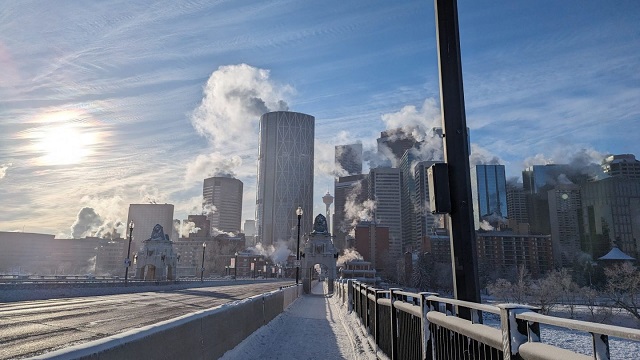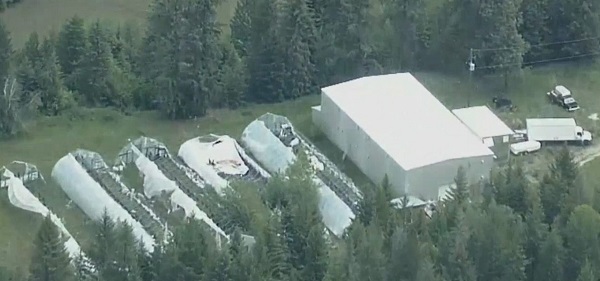Alberta
Alberta’s emergency grid alert underscores vital role diverse energy mix plays in Canada

From the Canadian Energy Centre
By Cody Ciona
After a major cold spell affected the capacity of Alberta’s power grid to provide electricity, experts weigh in on the need for multiple sources of energy
The crucial need for Canada to have a flexible and diverse energy grid was given a practical demonstration this past weekend as frigid winter temperatures in Alberta prompted a grid emergency.
With temperatures in some places dropping to almost –50C with the wind chill, provincial officials issued an emergency alert asking Albertans to immediately reduce electricity usage, with the grid approaching maximum capacity during peak hours.
With wind and solar assets unable to contribute power and the unexpected shutdown of two natural gas plants, Albertans faced the possibility of rolling blackouts in dangerously cold conditions.
A day after the emergency, the Alberta Electric System Operator (AESO) thanked Albertans who responded quickly to reduce the demand load.
“This is an example of why we need to ensure that we have sufficient dispatchable, dependable generation available to us as a province to meet what is always our most challenging time, which is those cold, dark winter nights,” Michael Law, CEO of AESO, told the Calgary Herald.
The prospect of failure in the worst possible circumstances prompted energy analysts to highlight the critical need for a diverse and flexible energy grid.
“You could have had 50,000 megawatts, all the solar farms and wind farms in the world located in Alberta, and it still wouldn’t have come anywhere close to closing that gap,” University of Alberta economics professor Andrew Leach told CBC News.
Wind and solar can be major contributors to the grid when conditions allow, but when the sun goes down and the wind stops, base load power sources like natural gas reliably protect the system.
Leach said system operators need to plan for supply to manage adverse weather conditions to ensure the reliability of the grid.
“Whether it’s natural gas, nuclear, import capacity, battery storage, etc., geothermal, there’s nobody that’s arguing against that.”
With policymakers pushing for more electrification, University of Alberta industrial engineering professor Tim Weis said Alberta isn’t alone in the need for resilient and stable power supply.
“I think we need to wrestle with that and realize that we are moving into a world where there’s going to be more electrical demands on the system,” he told Global News.
“We are moving into a new world. We’re not the only ones facing some of these challenges. I think we’re a little bit behind responding in terms of dispatchable demand and allowing consumers the opportunity to automatically respond to some of these things.”
As the federal government aims to decarbonize Canada’s electricity generation by 2035 with sweeping regulations, flexibility for some jurisdictions is a key factor that needs to be addressed, said University of Calgary associate professor of economics Blake Shaffer.
“I do think that this shows us that no amount of renewables would push us to have solved that winter peak on Saturday,” he told CTV Calgary.
“And that means flexibility to have a gas fleet, for example, that is capable of being there for a few hours for a few days, maybe a few weeks a year. And we need the technical and economic setup to make that worth their while to be there,” Shaffer said.
“We saw this cold weather coming, everybody was preparing for it. The wind forecast was out a week ago we saw there was going to be no wind. Thankfully, the gas thermal fleet performed amazingly well.”
Natural gas generation was able to backstop the reduction in renewable power, said ARC Energy Research Institute executive director Jackie Forrest.
“The system delivered during the deep freeze this past weekend… so reliably that no one even noticed… I have long argued that gaseous fuels are needed in the mix for energy transition and the need to become cleaner; this is why,” said Forrest on X, formerly known as Twitter.
According to Forrest’s colleague, energy economist Peter Tertzakian, Alberta’s oil sands industry also plays a big role in power generation in the province with the prominence of natural gas-powered cogeneration facilities.
“The power that’s generated in this province during this cold spell, about 40 per cent of it comes from cogeneration. The bulk of which comes from the oil sands and all their big generators which have surplus electricity that they feed into the grid,” said Tertzakian on ARC Energy Institute’s latest podcast.
“I think it’s important to understand that any policies that affect oil sands also affect the electricity grid.”
Alberta
Alberta’s grand bargain with Canada includes a new pipeline to Prince Rupert

From Resource Now
Alberta renews call for West Coast oil pipeline amid shifting federal, geopolitical dynamics.
Just six months ago, talk of resurrecting some version of the Northern Gateway pipeline would have been unthinkable. But with the election of Donald Trump in the U.S. and Mark Carney in Canada, it’s now thinkable.
In fact, Alberta Premier Danielle Smith seems to be making Northern Gateway 2.0 a top priority and a condition for Alberta staying within the Canadian confederation and supporting Mark Carney’s vision of making Canada an Energy superpower. Thanks to Donald Trump threatening Canadian sovereignty and its economy, there has been a noticeable zeitgeist shift in Canada. There is growing support for the idea of leveraging Canada’s natural resources and diversifying export markets to make it less vulnerable to an unpredictable southern neighbour.
“I think the world has changed dramatically since Donald Trump got elected in November,” Smith said at a keynote address Wednesday at the Global Energy Show Canada in Calgary. “I think that’s changed the national conversation.” Smith said she has been encouraged by the tack Carney has taken since being elected Prime Minister, and hopes to see real action from Ottawa in the coming months to address what Smith said is serious encumbrances to Alberta’s oil sector, including Bill C-69, an oil and gas emissions cap and a West Coast tanker oil ban. “I’m going to give him some time to work with us and I’m going to be optimistic,” Smith said. Removing the West Coast moratorium on oil tankers would be the first step needed to building a new oil pipeline line from Alberta to Prince Rupert. “We cannot build a pipeline to the west coast if there is a tanker ban,” Smith said. The next step would be getting First Nations on board. “Indigenous peoples have been shut out of the energy economy for generations, and we are now putting them at the heart of it,” Smith said.
Alberta currently produces about 4.3 million barrels of oil per day. Had the Northern Gateway, Keystone XL and Energy East pipelines been built, Alberta could now be producing and exporting an additional 2.5 million barrels of oil per day. The original Northern Gateway Pipeline — killed outright by the Justin Trudeau government — would have terminated in Kitimat. Smith is now talking about a pipeline that would terminate in Prince Rupert. This may obviate some of the concerns that Kitimat posed with oil tankers negotiating Douglas Channel, and their potential impacts on the marine environment.
One of the biggest hurdles to a pipeline to Prince Rupert may be B.C. Premier David Eby. The B.C. NDP government has a history of opposing oil pipelines with tooth and nail. Asked in a fireside chat by Peter Mansbridge how she would get around the B.C. problem, Smith confidently said: “I’ll convince David Eby.”
“I’m sensitive to the issues that were raised before,” she added. One of those concerns was emissions. But the Alberta government and oil industry has struck a grand bargain with Ottawa: pipelines for emissions abatement through carbon capture and storage.
The industry and government propose multi-billion investments in CCUS. The Pathways Alliance project alone represents an investment of $10 to $20 billion. Smith noted that there is no economic value in pumping CO2 underground. It only becomes economically viable if the tradeoff is greater production and export capacity for Alberta oil. “If you couple it with a million-barrel-per-day pipeline, well that allows you $20 billion worth of revenue year after year,” she said. “All of a sudden a $20 billion cost to have to decarbonize, it looks a lot more attractive when you have a new source of revenue.” When asked about the Prince Rupert pipeline proposal, Eby has responded that there is currently no proponent, and that it is therefore a bridge to cross when there is actually a proposal. “I think what I’ve heard Premier Eby say is that there is no project and no proponent,” Smith said. “Well, that’s my job. There will be soon. “We’re working very hard on being able to get industry players to realize this time may be different.” “We’re working on getting a proponent and route.”
At a number of sessions during the conference, Mansbridge has repeatedly asked speakers about the Alberta secession movement, and whether it might scare off investment capital. Alberta has been using the threat of secession as a threat if Ottawa does not address some of the province’s long-standing grievances. Smith said she hopes Carney takes it seriously. “I hope the prime minister doesn’t want to test it,” Smith said during a scrum with reporters. “I take it seriously. I have never seen separatist sentiment be as high as it is now. “I’ve also seen it dissipate when Ottawa addresses the concerns Alberta has.” She added that, if Carney wants a true nation-building project to fast-track, she can’t think of a better one than a new West Coast pipeline. “I can’t imagine that there will be another project on the national list that will generate as much revenue, as much GDP, as many high paying jobs as a bitumen pipeline to the coast.”
Alberta
Alberta Premier Danielle Smith Discusses Moving Energy Forward at the Global Energy Show in Calgary

From Energy Now
At the energy conference in Calgary, Alberta Premier Danielle Smith pressed the case for building infrastructure to move provincial products to international markets, via a transportation and energy corridor to British Columbia.
“The anchor tenant for this corridor must be a 42-inch pipeline, moving one million incremental barrels of oil to those global markets. And we can’t stop there,” she told the audience.
The premier reiterated her support for new pipelines north to Grays Bay in Nunavut, east to Churchill, Man., and potentially a new version of Energy East.
The discussion comes as Prime Minister Mark Carney and his government are assembling a list of major projects of national interest to fast-track for approval.
Carney has also pledged to establish a major project review office that would issue decisions within two years, instead of five.
-

 Crime1 day ago
Crime1 day agoManhunt on for suspect in shooting deaths of Minnesota House speaker, husband
-

 Business17 hours ago
Business17 hours agoCarney’s European pivot could quietly reshape Canada’s sovereignty
-

 Alberta17 hours ago
Alberta17 hours agoAlberta’s grand bargain with Canada includes a new pipeline to Prince Rupert
-

 conflict3 hours ago
conflict3 hours ago“Evacuate”: Netanyahu Warns Tehran as Israel Expands Strikes on Iran’s Military Command
-

 Bruce Dowbiggin2 hours ago
Bruce Dowbiggin2 hours agoWOKE NBA Stars Seems Natural For CDN Advertisers. Why Won’t They Bite?
-

 Energy2 hours ago
Energy2 hours agoCould the G7 Summit in Alberta be a historic moment for Canadian energy?
-

 Crime2 hours ago
Crime2 hours agoMinnesota shooter arrested after 48-hour manhunt






